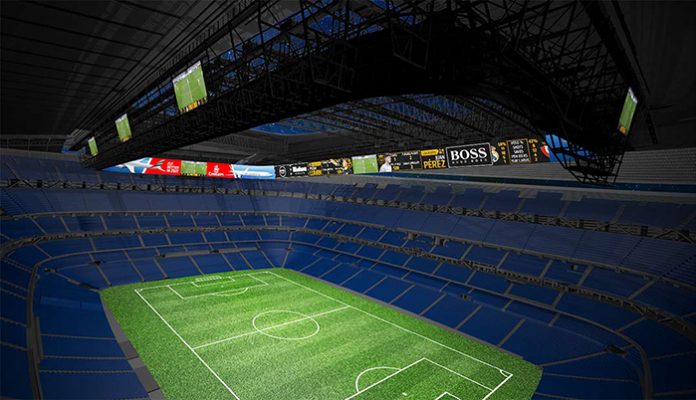Continuing a long-standing association, Real Madrid and Daktronics have announced a global and multi-year partnership agreement. Daktronics will be responsible for designing, manufacturing and installing, together with Legaz Arquitectura e Ingenieria, its partner for installations and services, a new LED halo display system at Santiago Bernabéu Stadium in the heart of Madrid, Spain. The project totals more than 3,700 square meters of LED displays and installation is planned throughout the calendar year of 2022.
“Thanks to this agreement with Daktronics, the new Santiago Bernabéu Stadium will have iconic advertising devices with the highest quality and technology available that will allow us to offer a unique experience to our fans and visitors through the contents,” said Enrique Uriel, Real Madrid CF IT Director.
Plans for the renovation and technology upgrades began with discussions back in 2016 as the teams involved looked over concepts and possibilities. Trips to other world-renowned stadiums took place over the years to experience the live event atmosphere and the technology firsthand. The process led to the selection of the halo design and additional displays.
“In the process of deciding what design to implement, many iterations and ideas were considered and vetted, analyzing different existing projects, before moving forward with a 360 degrees Halo,” said Ivan del Rio, Daktronics regional manager. “With this LED displays configuration, the Santiago Bernabéu stadium will be at the forefront of technology and at the same level as the best stadiums in the world. These video screens will serve Real Madrid CF to offer unique experiences both in its football competitions and in the other multiple uses of the stadium in the future.”
The halo combines 18 total LED displays, both on the inside and backside, to form the centerpiece of game-day experience for Real Madrid as well as other events held at the multi-use facility. The two displays along the inner sideline of the halo each measure 6.58 meters high by 114.12 meters long while the two inner goal end displays each measure 6.58 meters high by 52.69 meters wide.
On the backside of the halo, 10 total displays will be installed, each measuring 5.49 meters high by 9.88 meters wide. Three of these displays will be installed along the sideline backside on each side of the field and two will be installed on the goal end backside on each end of the field.
The inside corners of the halo will each feature a freeform ProPixel stick display to curve the corner and deliver an uninterrupted continuous view of digital content. Each corner display will measure 6.60 meters high by 16.53 meters wide and curve around the inner corners of the halo.
The inside corner displays will feature 25-millimeter pixel spacing and all the other displays on the halo will feature 13HD pixel layouts to deliver excellent image clarity and contrast to audiences in every seat.
The 13HD displays are capable of variable content zoning which allows each to show one large image or to show multiple zones of content. This content can include live video, instant replays, up-to-the-minute statistics, graphics and animations, and sponsorship messages.
A ribbon display will also be mounted to the seating fascia of the stadium as part of this project. It will feature a 13HD pixel layout and measure 1.10 meters high by 491.47 meters long. This display can show supplemental information and graphics to the halo while also providing the opportunity to highlight sponsors throughout events.
Daktronics will also be including its powerful Show Control solution with this installation. This industry-leading system provides a combination of display control software, world-class video processing, data integration and playback hardware that forms a user-friendly production solution.



